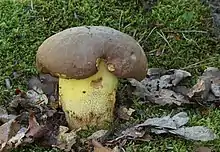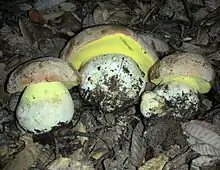Butyriboletus
Butyriboletus is a genus of fungi in the family Boletaceae. The genus was circumscribed in 2014 by mycologists David Arora and Jonathan L. Frank to accommodate "butter bolete" species that were shown by molecular analysis to be phylogenetically distinct from Boletus. Butyriboletus contains 24 ectomycorrhizal species found in Asia, Europe, North America and north Africa.[1][2][3]
| Butyriboletus | |
|---|---|
 | |
| Butyriboletus appendiculatus | |
| Scientific classification | |
| Domain: | Eukaryota |
| Kingdom: | Fungi |
| Division: | Basidiomycota |
| Class: | Agaricomycetes |
| Order: | Boletales |
| Family: | Boletaceae |
| Genus: | Butyriboletus D.Arora & J.L.Frank (2014) |
| Type species | |
| Butyriboletus appendiculatus (Schaeffer) D.Arora & J.L.Frank (2014) | |
The group had earlier been classified as the section Appendiculati within the large genus Boletus. They were given the common name "butter boletes" as the color of their stalk, flesh and pores was similar to that of butter.[2] Genetic analysis published in 2013 shows that these species are part of a regius clade (named for B. regius), distinct from the core group of the type species B. edulis and relatives within the Boletineae.[4] The narrowing of Boletus to this latter group meant that this group would need to be placed in a separate genus, with Boletus appendiculatus (now Butyriboletus appendiculatus) designated as the type species. The genus name itself is derived from the Latin butyrum "butter".[2]
The butter boletes have red or brown caps, yellow pores and stipes that turn blue when cut or bruised in many species, and olive-brown spindle-shaped spores.[2] Their flesh is usually mild tasting.[5] Butyriboletus roseoflavus is a highly regarded edible mushroom sold in markets in southwestern and southeastern China,[6] while two other species—B. yicibus and B. sanicibus—are eaten to a lesser degree in Yunnan Province.[2]
Species

The following species are recognized, though more may yet be described from Japan, Mexico and China.[2]
- Butyriboletus abieticola
- Butyriboletus appendiculatus
- Butyriboletus autumniregius
- Butyriboletus brunneus
- Butyriboletus cepaeodoratus
- Butyriboletus fechtneri
- Butyriboletus floridanus
- Butyriboletus frostii
- Butyriboletus fuscoroseus
- Butyriboletus huangnianlaii
- Butyriboletus loyo
- Butyriboletus peckii
- Butyriboletus persolidus
- Butyriboletus primiregius
- Butyriboletus pulchriceps
- Butyriboletus querciregius
- Butyriboletus regius
- Butyriboletus roseoflavus
- Butyriboletus roseogriseus
- Butyriboletus roseopurpureus
- Butyriboletus sanicibus
- Butyriboletus subappendiculatus
- Butyriboletus ventricosus
- Butyriboletus yicibus
References
- Vizzini A. (2014). "Nomenclatural novelties". Index Fungorum. 162: 1. ISSN 2049-2375.
- Arora D, Frank JL (2014). "Clarifying the butter Boletes: a new genus, Butyriboletus, is established to accommodate Boletus sect. Appendiculati, and six new species are described". Mycologia. 106 (3): 464–80. doi:10.3852/13-052. PMID 24871600. S2CID 207708824.
- Zhai K, Wu G, Halling R, Yang ZL (2015). "Three new combinations of Butyriboletus (Boletaceae)". Phytotaxa. 234 (1): 51–62. doi:10.11646/phytotaxa.234.1.3.
- Nuhn ME, Binder M, Taylor AF, Halling RE, Hibbett DS (2013). "Phylogenetic overview of the Boletineae". Fungal Biology. 117 (7–8): 479–511. doi:10.1016/j.funbio.2013.04.008. PMID 23931115.
- Assyov B. (2012). "Revision of Boletus section Appendiculati (Boletaceae) in Bulgaria with a key to the Balkan species" (PDF). Turkish Journal of Botany. 36: 408–19. doi:10.3906/bot-1104-10. Archived from the original (PDF) on 2014-07-14.
- Li H, Wei H, Peng H, Ding H, Wang L, He L, Fu L (2014). "Boletus roseoflavus, a new species of Boletus in section Appendiculati from China". Mycological Progress. 13 (1): 21–31. doi:10.1007/s11557-013-0888-4. S2CID 14238766.